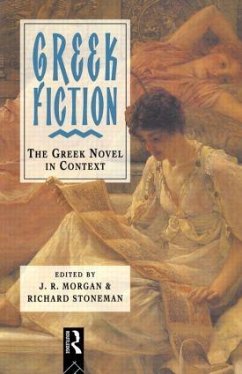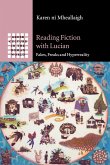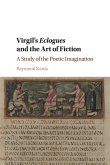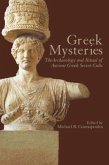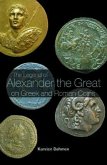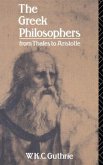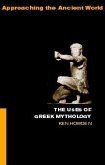- Broschiertes Buch
- Merkliste
- Auf die Merkliste
- Bewerten Bewerten
- Teilen
- Produkt teilen
- Produkterinnerung
- Produkterinnerung
First published in 1994. Routledge is an imprint of Taylor & Francis, an informa company.
Andere Kunden interessierten sich auch für
![Reading Fiction with Lucian Reading Fiction with Lucian]() Karen Ní MheallaighReading Fiction with Lucian41,99 €
Karen Ní MheallaighReading Fiction with Lucian41,99 €![Virgil's Eclogues and the Art of Fiction Virgil's Eclogues and the Art of Fiction]() Raymond KaniaVirgil's Eclogues and the Art of Fiction37,99 €
Raymond KaniaVirgil's Eclogues and the Art of Fiction37,99 €![Greek Mysteries Greek Mysteries]() Michael B. Cosmopoulos (ed.)Greek Mysteries65,99 €
Michael B. Cosmopoulos (ed.)Greek Mysteries65,99 €![The Legend of Alexander the Great on Greek and Roman Coins The Legend of Alexander the Great on Greek and Roman Coins]() Karsten DahmenThe Legend of Alexander the Great on Greek and Roman Coins62,99 €
Karsten DahmenThe Legend of Alexander the Great on Greek and Roman Coins62,99 €![Greek Sanctuaries Greek Sanctuaries]() Robin Hagg (ed.)Greek Sanctuaries62,99 €
Robin Hagg (ed.)Greek Sanctuaries62,99 €![The Greek Philosophers The Greek Philosophers]() W. K. C. GuthrieThe Greek Philosophers59,99 €
W. K. C. GuthrieThe Greek Philosophers59,99 €![The Uses of Greek Mythology The Uses of Greek Mythology]() Ken DowdenThe Uses of Greek Mythology59,99 €
Ken DowdenThe Uses of Greek Mythology59,99 €-
-
-
First published in 1994. Routledge is an imprint of Taylor & Francis, an informa company.
Hinweis: Dieser Artikel kann nur an eine deutsche Lieferadresse ausgeliefert werden.
Hinweis: Dieser Artikel kann nur an eine deutsche Lieferadresse ausgeliefert werden.
Produktdetails
- Produktdetails
- Verlag: Routledge
- Seitenzahl: 304
- Erscheinungstermin: 24. März 1994
- Englisch
- Abmessung: 216mm x 140mm x 18mm
- Gewicht: 431g
- ISBN-13: 9780415085076
- ISBN-10: 0415085071
- Artikelnr.: 21320886
- Herstellerkennzeichnung
- Libri GmbH
- Europaallee 1
- 36244 Bad Hersfeld
- gpsr@libri.de
- Verlag: Routledge
- Seitenzahl: 304
- Erscheinungstermin: 24. März 1994
- Englisch
- Abmessung: 216mm x 140mm x 18mm
- Gewicht: 431g
- ISBN-13: 9780415085076
- ISBN-10: 0415085071
- Artikelnr.: 21320886
- Herstellerkennzeichnung
- Libri GmbH
- Europaallee 1
- 36244 Bad Hersfeld
- gpsr@libri.de
John Morgan is Lecturer in Classics at University College, Swansea. He has published extensively on ancient fiction. Richard Stoneman is a writer specialising in Greek history, culture and travel. He is the author of the Penguin translation of the Greek Alexander Romance. Cover illustration: Th, Favourite Pod by Lawrence Alma-Tadema, courtesy of the Board of Trustees of the National Museums and Galleries on Merseyside.
Introduction, J. R. Morgan
Part 1 The Beginnings of Greek Fiction
Chapter 1 The Education of Cyrus, James Tatum
Part 2 The Love Romances
Chapter 2 Looking at Chariton's Callirhoe, Brigitte Egger
Chapter 3 Xenophon of Ephesus, David Konstan
Chapter 4 Daphnis and Chloe, J. R. Morgan
Chapter 5 Achilles Tatius and Ego-Narrative, B. P. Reardon
Chapter 6 The Aithiopika of Heliodoros, J. R. Morgan
Part 3 The Greek Context
Chapter 7 The Alexander Romance, Richard Stoneman
Chapter 8 New Pages of Greek Fiction, Gerald Sandy
Chapter 9 The Epistolary Novel, Patricia A. Rosenmeyer
Chapter 10 Dio and Lucian, Simon Swain
Chapter 11 Philostratus, Ewen Bowie
Part 4 Other Traditions
Chapter 12 Egyptian Fiction in Demotic and Greek, John Tait
Chapter 13 The Jewish Novellas, Lawrence M. Wills
Chapter 14 Early Christian Fiction, Richard I. Pervo
Chapter 15 Representation in Greek Saints' Lives, Judith Perkins
Part 5 Aftermath
Chapter 16 Byzantine Developments, Suzanne MacAlister
Part 1 The Beginnings of Greek Fiction
Chapter 1 The Education of Cyrus, James Tatum
Part 2 The Love Romances
Chapter 2 Looking at Chariton's Callirhoe, Brigitte Egger
Chapter 3 Xenophon of Ephesus, David Konstan
Chapter 4 Daphnis and Chloe, J. R. Morgan
Chapter 5 Achilles Tatius and Ego-Narrative, B. P. Reardon
Chapter 6 The Aithiopika of Heliodoros, J. R. Morgan
Part 3 The Greek Context
Chapter 7 The Alexander Romance, Richard Stoneman
Chapter 8 New Pages of Greek Fiction, Gerald Sandy
Chapter 9 The Epistolary Novel, Patricia A. Rosenmeyer
Chapter 10 Dio and Lucian, Simon Swain
Chapter 11 Philostratus, Ewen Bowie
Part 4 Other Traditions
Chapter 12 Egyptian Fiction in Demotic and Greek, John Tait
Chapter 13 The Jewish Novellas, Lawrence M. Wills
Chapter 14 Early Christian Fiction, Richard I. Pervo
Chapter 15 Representation in Greek Saints' Lives, Judith Perkins
Part 5 Aftermath
Chapter 16 Byzantine Developments, Suzanne MacAlister
Introduction, J. R. Morgan
Part 1 The Beginnings of Greek Fiction
Chapter 1 The Education of Cyrus, James Tatum
Part 2 The Love Romances
Chapter 2 Looking at Chariton's Callirhoe, Brigitte Egger
Chapter 3 Xenophon of Ephesus, David Konstan
Chapter 4 Daphnis and Chloe, J. R. Morgan
Chapter 5 Achilles Tatius and Ego-Narrative, B. P. Reardon
Chapter 6 The Aithiopika of Heliodoros, J. R. Morgan
Part 3 The Greek Context
Chapter 7 The Alexander Romance, Richard Stoneman
Chapter 8 New Pages of Greek Fiction, Gerald Sandy
Chapter 9 The Epistolary Novel, Patricia A. Rosenmeyer
Chapter 10 Dio and Lucian, Simon Swain
Chapter 11 Philostratus, Ewen Bowie
Part 4 Other Traditions
Chapter 12 Egyptian Fiction in Demotic and Greek, John Tait
Chapter 13 The Jewish Novellas, Lawrence M. Wills
Chapter 14 Early Christian Fiction, Richard I. Pervo
Chapter 15 Representation in Greek Saints' Lives, Judith Perkins
Part 5 Aftermath
Chapter 16 Byzantine Developments, Suzanne MacAlister
Part 1 The Beginnings of Greek Fiction
Chapter 1 The Education of Cyrus, James Tatum
Part 2 The Love Romances
Chapter 2 Looking at Chariton's Callirhoe, Brigitte Egger
Chapter 3 Xenophon of Ephesus, David Konstan
Chapter 4 Daphnis and Chloe, J. R. Morgan
Chapter 5 Achilles Tatius and Ego-Narrative, B. P. Reardon
Chapter 6 The Aithiopika of Heliodoros, J. R. Morgan
Part 3 The Greek Context
Chapter 7 The Alexander Romance, Richard Stoneman
Chapter 8 New Pages of Greek Fiction, Gerald Sandy
Chapter 9 The Epistolary Novel, Patricia A. Rosenmeyer
Chapter 10 Dio and Lucian, Simon Swain
Chapter 11 Philostratus, Ewen Bowie
Part 4 Other Traditions
Chapter 12 Egyptian Fiction in Demotic and Greek, John Tait
Chapter 13 The Jewish Novellas, Lawrence M. Wills
Chapter 14 Early Christian Fiction, Richard I. Pervo
Chapter 15 Representation in Greek Saints' Lives, Judith Perkins
Part 5 Aftermath
Chapter 16 Byzantine Developments, Suzanne MacAlister

